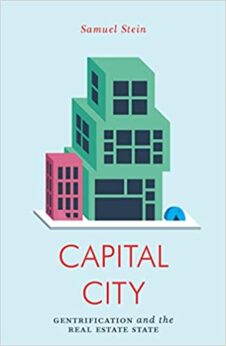
DETROIT – If there is anything overshadowing the focus on COVID-19 and other anxieties this year, it’s that the real estate market has been booming. We’ve been assured this is, in fact, a “boom” not another “bubble”—experts citing reasons like underbuilding housing needs over the last 20 years in the U.S. as the cause for increased prices. High demand with low supply may seem like the simplest way to explain the boom; however, this is only a high level view of the issue.
Within this lack of supply, we have investment groups and corporations, like RedfinNow buying houses in large quantities. Not to mention that Black homeowners are drastically underrepresented in this boom—white homeownership being as high as 30% above Black homeownership. This tends to be due to the relation of debt to mortgage accessibility: mortgage rates are incredibly low right now, but due to the fact that a Black person is more than twice as likely to be rejected for a mortgage than a white person.
Now the real estate boom seems situated in its proper context today.
So, where does this leave Detroit? The city is roughly 78% Black and also undergoing a massive corporate takeover of its housing market.

It seems worse news was on the horizon: according to a recent investigation by NBC News and Outlier Media, a “fake landlord” scam has been running rampant in Detroit for the past decade, where 1 in 10 tenants are facing eviction because of it. The scam is pretty straightforward and involves someone posing as a landlord, falsifying documents, collecting rent or mortgage payments from tenants. These “landlords” are sometimes actual landlords who have had their properties foreclosed upon and never alerted tenants they are no longer, in fact, their landlord; and sometimes it’s someone breaking into a vacant home and listing it as for rent or sale. Given the lack of supply and mortgage approvals, Detroiters seem particularly vulnerable to such scams.
When it comes to legitimate property ownership, management companies, housing developers, and landlords have been posing as the victims during the pandemic and eviction moratorium. Despite heavy losses, landlords and developers do not suffer the same as their tenants do after an eviction.
As for development, the recent issue over the Herman Kiefer development—a planned rehabilitation of 100 homes and a $143 million redevelopment of a vacant hospital campus—has shed light on this contradiction between residents and property owners. The project itself has been hindered by the pandemic, but only 15 out of the 117 homes in the project have been rehabilitated, and residents have not seen any benefits of this project. The City council rejected a proposal for the developer, Ron Castellano, to return 39 homes and 102 open lots to the Detroit Land Bank Authority, an organization that attempts to “make homeownership….accessible to Detroiters.” The Land Bank would then auction off the properties at an 80% discount.
City Council President Brenda Jones was right to point out “[t]he developer missed some of the deadline dates. What happens when other Detroiters miss Land Bank deadlines? Their houses get taken, is that correct? I guess I’m trying to understand certain standards for some and certain standards for others.”
Although auctioning these properties at such a heavy discount could potentially benefit residents, Jones voted against the proposal for fear that investors would outbid Detroiters, an epidemic already occurring here. This indicates something stronger, something more favorable to Detroit and its residents is needed.
 As Samuel Stein points out in his book Capital City, using New York City as the example, growth in housing tends to be “eaten by emptiness.” Real estate developments tend to only favor the developers and investors. Either the rent is too high or properties are kept empty intentionally for the sake of “investment vehicles” or Airbnb rentals. Despite the ubiquity of the phrase “affordable housing,” rent is anything but affordable as new developments pop up.
As Samuel Stein points out in his book Capital City, using New York City as the example, growth in housing tends to be “eaten by emptiness.” Real estate developments tend to only favor the developers and investors. Either the rent is too high or properties are kept empty intentionally for the sake of “investment vehicles” or Airbnb rentals. Despite the ubiquity of the phrase “affordable housing,” rent is anything but affordable as new developments pop up.
It may seem counterintuitive to develop housing and to prefer it remain empty, but the logic behind this is clear: with a demand for housing through shortages and skyrocketing prices, rental properties can afford to be empty temporarily.
Landlords and developers, fake or real, are not helping Detroiters. Some good news did come earlier this month when it was announced $60 million had been rewarded (with $16 million more awaiting approval) to residents for eviction prevention. Unfortunately, this is only part of the story of housing in Detroit.
The recent general election in Detroit yielded a win for incumbent Mayor Mike Duggan. Duggan, the candidate of choice by DTE, the Honigman Law firm, and Dan Gilbert’s corporate collective, took the mayoral race in a landslide against Anthony Adams. The third-term mayor has been a consistent opponent to housing rehabilitation projects and proposals that would implement affordable housing guidelines.
Over the summer, Proposal P—which would have limited the police budget and offered reparations to homeowners who have been over-taxed for years, among other things—was defeated in a landslide after a well-saturated campaign against it. The arguments against Proposal P suggested another bankruptcy after the city has finally come back from the last one. Citizens aren’t quick to forget the city’s bankruptcy of 2014 and concerns over the budget have played well in swaying voters. Although a known opponent to the proposal, Mayor Duggan would later try to cherry pick pieces of the proposal via his planned budgeting of the American Rescue Plan Act funds.
The mayor’s planned budget for ARPA funds was the result of 65 public meetings and an online survey. After focusing nearly half the funds on “budget shortfalls,” $426 million was to be divided up between what Detroit residents wanted most. Despite overwhelming support for spending the funds on rebuilding housing and fighting poverty, $90 million was set aside for demolition (primarily of blighted commercial buildings), $45 million for high-speed internet, and $105 million for job creation—which has been labeled as “fighting generational poverty.” More focus would be put on “digital equity”—making high-speed internet more accessible—than housing.
Many residents echoed concerns during the hosted meetings earlier this year—ranging from being confused about what the categories included to being forced to decide too quickly. City Council Member Raquel Castañeda-López argued that more time was needed to review the budget. Nevertheless, the proposed budget was passed.
Citizens have been outspoken about the explicit redirection of funds away from their demands. Organizations like the Charlevoix Village Association and Detroit Will Breathe stood outside the mayor’s mansion the day the city council decided to approve the plan to make their voices heard. Since then, the CVA has held demonstrations and made demands for more funds to be focused on housing and not just for seniors and low-income residents.
“If someone is making $15 an hour, they won’t be considered low-income and can’t qualify for this money,” Toyia Watts of the CVA said. “But what kind of budget do you think they have to do major repairs to their homes?”
Working from the other side of the same coin as the CVA, the United Community Housing Coalition has been working to ensure housing for seniors and low-income residents.
Claudia Sanford, who has been with the Housing Coalition for 11 years, has worked on several projects to help house and relocate residents who have been displaced and dispossessed.
“I work on a lot of projects where the whole building has been sold so we negotiate with the owners for time and the people living there. We leverage money from the source to pay for the relocation which gives me time when there’s displacement going on,” says Sanford.
The rise in these organizations’ involvement in campaigns for Proposal P and influencing how the ARPA funds are spent is enough to give the people hope while also disillusioning citizens of the effectiveness of both Democrat and Republican candidates. By directly addressing peoples’ means and standing up for their demands, grassroots collectives like the CVA, UCHC, Detroit Will Breathe, and For the People have shifted the importance of politics away from party-based ideologies and onto housing, clean water, food availability (as opposed to access), and defunding the police.
Mayor Duggan has proposed to raise $50 million to help fund a “series of programs” to help out citizens who have been “left behind.” He also predicts a shift will occur in office spaces downtown toward more residential areas. Duggan can rightfully be proud of how drastically different the riverfront is today – despite the project to change the riverfront beginning before he took office. He can even lay claim to preventing somewhere between 6,000 and 7,000 evictions—as of last month, it was reported there were over 13,000 eviction cases on file with the 36th district court. However, will these changes be enough? Will the shift from open office space to housing be more than accessible to people—will it be affordable? Will it be available?
Despite the uncertainty of what Duggan will bring to the city in his third term, some good news did come out of Tuesday. Proposal R, which is to establish a reparations task force, did win at 80% approval. Although reparations were defeated back in August with the fall of Proposal P, the creation of this task force—introduced by City Council President Pro Tem Mary Sheffield—is a major step forward. Indeed this task force could yield unprecedented results in addressing racism in the city, limiting police power, protecting residents’ housing, and raising wages are needed to round out the entire fight against racism—one ingrained into the political economy today; specifically, to address the overt violence police enact against Black communities, the effects of redlining, and racial justifications like “unskilled labor” for paying lower wages.
Reparations are usually dismissed as a viable solution because they privilege only one community over something that happened “a long time ago.” However, the history of violence didn’t end there and reparations are more relevant today than ever. Far from being an “equalizer,” reparations would make good on contemporary injustices like criminally overtaxing Detroit homeowners and the outright dispossession of property.
The ultimate revival of Detroit cannot depend on investors or precarious young professionals or even technological advances which will be outmoded in a handful of short years. Detroit’s residents, new and old, need housing and protection of that housing. This is a political issue that requires more from the mayor and city council than indifference toward our demands.










